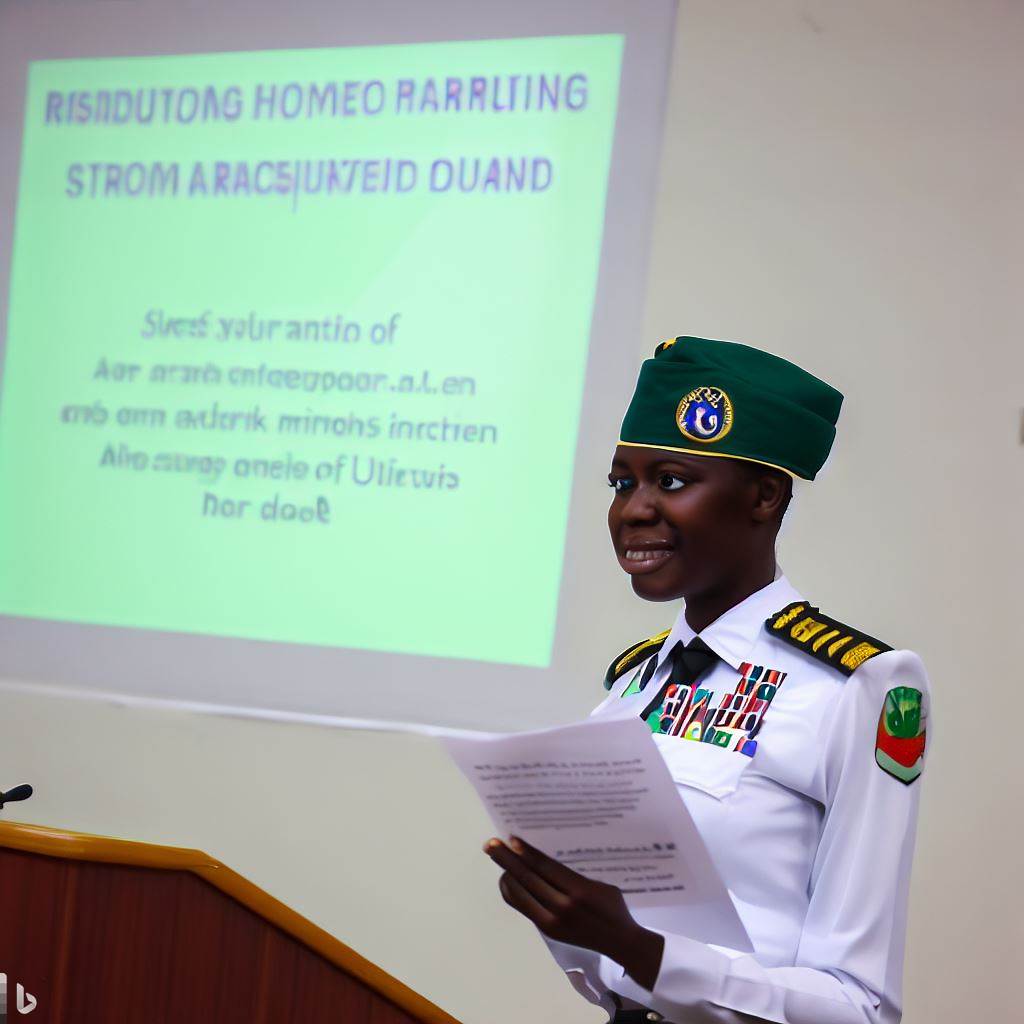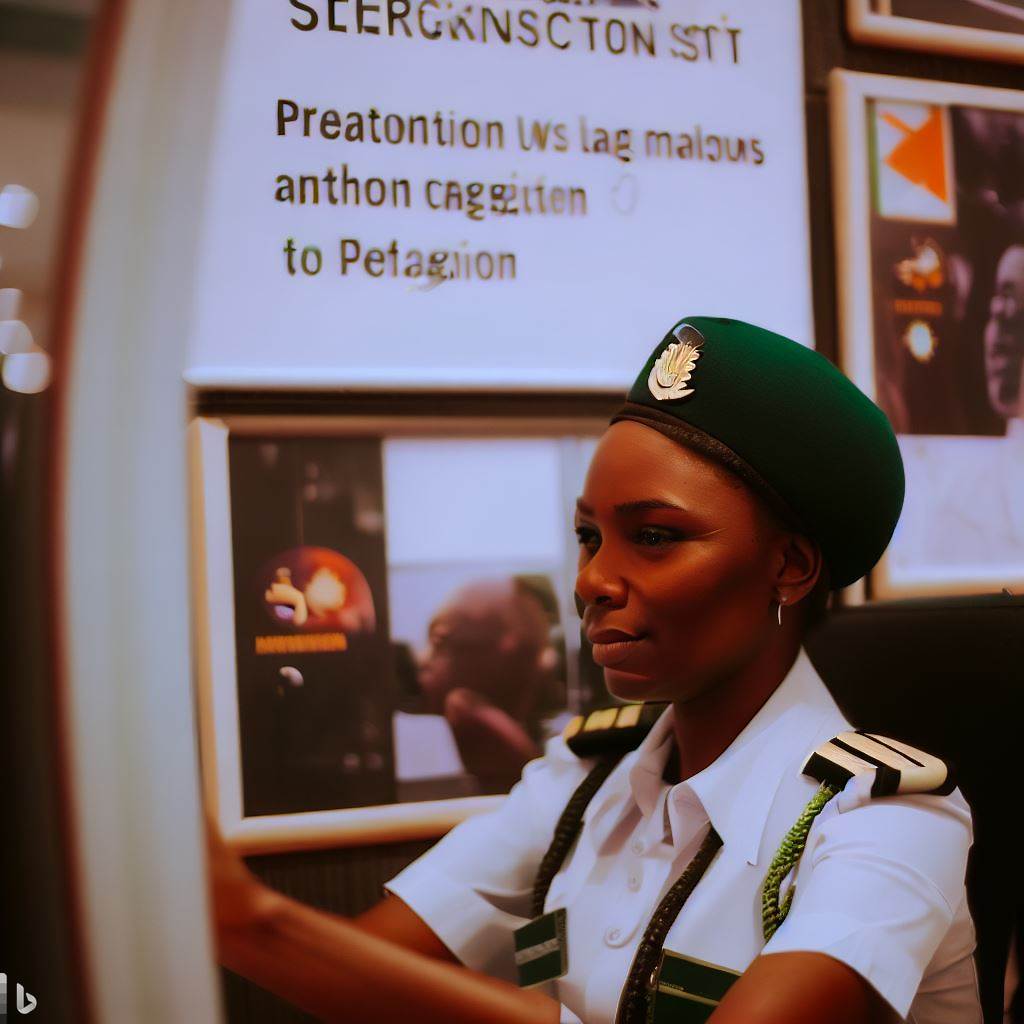Introduction
Nigeria’s aviation industry has been rapidly growing, with an increase in air travel demand and investment in infrastructure. However, the industry still lacks gender diversity, with women being significantly underrepresented in various roles.
Gender diversity is crucial in the industry, as it not only promotes inclusivity and equality, but also enhances productivity and innovation.
Women bring unique skills, perspectives, and experiences to the sector, which can contribute to its growth.
This blog post aims to explore the role of women in Nigeria’s aviation industry, highlighting their accomplishments, challenges, and opportunities.
By shedding light on their experiences, we can advocate for greater gender diversity and encourage more women to pursue careers in aviation.
Read: Steps to Becoming a Pilot in Nigeria: A Comprehensive Guide
Historical Overview
The role of women in Nigeria’s aviation industry has come a long way since the first Nigerian female pilot, Capt. Chinyere Kalu, became a certified commercial pilot in 1978.
At the time, Capt. Kalu was the only woman among her male counterparts, and her achievement paved the way for other pioneering Nigerian women in aviation to follow.
- Capt. Abimbola Jayeola
- Capt. Genevieve Nwafor
- Capt. Ademilola Odujinrin
These women were not only pilots, but also aviation engineers, air traffic controllers, and airline executives.
However, despite their accomplishments, women in aviation have faced various challenges in the past.
A major obstacle for women in aviation
One major obstacle for women in aviation was the lack of support and encouragement from society. Many people at the time believed that women were not fit for aviation and discouraged them from pursuing a career in the industry.
As a result, most women in aviation had to overcome their own doubts and fears and rely on their own determination and hard work to succeed.
Another challenge was the lack of infrastructure and resources for women in aviation. Many aviation schools and training centers at the time were not designed to cater to women, and female students often faced discrimination and harassment from their male counterparts and instructors.
Furthermore, many airlines and aviation companies had policies that discouraged or outright prohibited women from working in certain positions, such as pilots or air traffic controllers.
Despite these challenges, however, women in aviation persisted and continued to make significant contributions to the industry.
Today, women in Nigeria’s aviation industry can be found in all areas of the industry, from pilots to engineers to executives. Many airlines and aviation companies have also implemented policies and programs to support the recruitment and retention of women in aviation.
Some of these initiatives include scholarships, mentorship programs, and leadership training programs specifically designed for women.
These programs aim to give women the support, guidance, and resources they need to succeed in the industry and take on leadership roles.
As the aviation industry in Nigeria continues to grow and evolve, the role of women in the industry will undoubtedly become increasingly important.
With the right support and resources, women in aviation will continue to make significant contributions to the industry and inspire future generations of women to pursue careers in aviation.
Read: Nigeria’s Aviation Sector: Salary and Compensation
Progress Made
Current Statistics on the Number of Women in the Aviation Industry
Over the years, Nigeria’s aviation industry has not been gender-inclusive, leaving women underrepresented as compared to their male counterparts.
However, progress has been made in recent years towards advocating for gender neutrality in the aviation industry.
As of 2021, the number of women in the aviation industry has increased, and according to the Nigerian Civil Aviation Authority (NCAA), women account for 23% of the industry’s workforce.
Ways in Which Women are Making an Impact in the Industry
Women in Nigeria’s aviation industry have been breaking barriers and making significant impacts in the sector.
Female pilots, air traffic controllers, engineers, and other aviation professionals have contributed to the growth and development of the industry, bringing new ideas and perspectives to the table.
Through their innovation and creativity, the aviation industry has improved in terms of efficiency, safety, and quality.
Female pilots such as Captain Chinyere Kalu have been making waves in the industry, becoming the first Nigerian female commercial pilot to fly an aircraft alone.
Also, Captain Abimbola Jayeola holds the title of the first Nigerian female captain of a commercial airline. These feats have inspired young women to pursue careers in the aviation industry and to aspire to achieve greater heights.
Women have also made significant progress in air traffic control, where they have proven to be equally competent and successful as men in the sector.
Mary Omolara Unuigbe is a remarkable Nigerian air traffic controller and has made a notable contribution to air traffic management in the industry.
In engineering, women have also been innovative, with a good number of them making groundbreaking inventions.
One of such women is Blessing Liman, the first female helicopter engineer in Nigeria, who has worked on several helicopter brands such as Bell, Sikorsky, and AugustaWestland.
Success Stories of Nigerian Women in Aviation
The aviation industry has recorded several success stories through the contributions of women. These women have defied all odds and made a name for themselves in the sector.
One of such women is Captain Amina Bello, who has made significant progress in the aviation industry. Captain Amina Bello is the first Nigerian female military pilot and has broken several records in the sector.
She has flown different types of aircraft, from military jet fighters to transport planes, and has represented Nigeria at various international events.
Another remarkable woman is Olubunmi Ogunmare, who is also making a name for herself in the industry. Ogunmare is the first Nigerian female certified aviation investigator.
She has represented Nigeria and Africa in several accident and incident investigations, making significant contributions to the success of the investigation.
Ogunmare has also been recognized by the International Civil Aviation Organization (ICAO) for her outstanding work in aviation safety.
In essence, the involvement of women in Nigeria’s aviation industry has come a long way, and progress has been made in advocating for gender equality.
Women have proven their worth, making significant contributions to the industry’s growth and development.
These women serve as role models to young girls who aspire to join the aviation industry. It is our hope that the industry will continue to embrace diversity, promoting inclusivity irrespective of gender, race, or cultural differences.

Challenges Faced Today
Despite the strides made by women in the aviation industry, there are still significant challenges that they face. These challenges can have an impact on their career growth, overall job satisfaction, and work-life balance.
Gender Bias and Discrimination
One of the most significant challenges faced by women in the aviation industry is gender bias and discrimination.
Despite the progress made in gender equality, there is still a prevalent belief that a woman cannot handle certain roles like her male counterparts. This has led to a lack of opportunities for female pilots, engineers, and air traffic controllers.
Discrimination can also occur in the form of unequal pay, lack of promotions, and harassment at work. Female pilots, for example, earn significantly less than their male counterparts. This is a clear indication of the bias that exists in the industry.
Lack of Adequate Facilities and Support Systems for Women in the Industry
Women in the aviation industry face many obstacles that their male colleagues do not, such as a lack of proper facilities and support systems.
The work environment is often designed with male employees in mind, leaving female employees with inadequate access to locker rooms, changing areas, and restrooms. This can be a physical and emotional barrier for women in the industry.
Lack of support systems also poses a challenge for women. For example, pregnancy and maternity leave can be difficult for female pilots who need to stay fit and healthy to keep their license.
There is a lack of policies and support systems in place to accommodate such women, making it difficult for them to balance their family responsibilities while remaining active in the industry.
Balancing Family and Work Responsibilities
One of the most significant challenges faced by women in the aviation industry is balancing their family and work responsibilities.
This is especially true for female pilots, whose work schedules can be unpredictable and require them to be away from home for extended periods.
Furthermore, the aviation industry often requires employees to move frequently to different cities or even countries.
This can be a challenge for women who have families and children. Finding good childcare and schools in a new area can be difficult, making it difficult for women to pursue their careers without sacrificing their family life.
The challenges faced by women in the aviation industry are significant, but they can be overcome with the right support and policies in place.
Eliminating gender bias and discrimination, providing adequate facilities and support systems for women, and creating policies that accommodate family responsibilities can help women achieve success in the industry.
The aviation industry stands to benefit significantly from an increase in female employees. Women bring fresh perspectives, innovation, and diversity to the industry, which can lead to better outcomes for all stakeholders.
Read: Decoding Aviation Licensing in Nigeria
Government and Private Organizations’ Interventions
Without a doubt, the Nigerian government and private organizations have intervened significantly in supporting and promoting women’s participation in Nigeria’s aviation industry.
Some of these interventions include policies and initiatives aimed at promoting gender diversity in the industry, partnerships and collaborations with reputable international organizations for capacity-building, and the role of mentorship and networking in supporting women in aviation.
Policies and Initiatives Aimed at Promoting Gender Diversity in Aviation
The Nigerian government has formulated policies aimed at promoting gender diversity in the aviation industry.
For instance, the Federal Ministry of Aviation has developed guidelines and policies for the recruitment, training, and career advancement of women in the industry.
The policies emphasize the importance of equal opportunities for all, irrespective of gender, and encourages the elimination of gender-based discrimination in recruitment and training.
Furthermore, aviation organizations in Nigeria have also developed initiatives aimed at promoting gender diversity in the industry.
For instance, some airlines have established programs aimed at recruiting and training more women as pilots, engineers, and air traffic controllers.
These initiatives have positively impacted women’s participation in the industry, as more women are now gaining employment in various capacities in the aviation industry.
Partnerships and Collaborations with Reputable International Organizations for Capacity-Building
Several international organizations collaborate with Nigerian aviation organizations in promoting gender diversity and building capacity in the industry.
For instance, the International Civil Aviation Organization (ICAO) partners with Nigerian aviation authorities to organize capacity-building programs aimed at promoting the participation of women in the aviation industry.
Also, the Women in Aviation International (WAI) has a Nigerian chapter that works with aviation organizations in Nigeria to promote the participation of women in the industry.
Through these partnerships and collaborations, women have access to the necessary training and support needed to build a career in the aviation industry.
The Role of Mentorship and Networking in Supporting Women in Aviation
Mentorship and networking play a significant role in supporting women in the aviation industry. Women can learn from the experiences of other women who have successfully built a career in the industry.
Mentors can provide guidance, advice, and support to women, helping them navigate the many challenges in the industry.
Also, networking provides an opportunity for women to connect with other women in the industry, exchange knowledge and ideas, and build supportive relationships.
Networking enables women to gain inspiration from the success stories of other women in the industry, boosting their confidence and aspiration.
The government and private organizations have played a significant role in supporting women’s participation in Nigeria’s aviation industry.
Policies and initiatives aimed at promoting gender diversity, partnerships and collaborations with reputable international organizations for capacity-building, and mentorship and networking opportunities all contribute to the growth and development of women in the industry.
These interventions should continue to be strengthened to create a more gender-balanced and thriving aviation industry in Nigeria.
Read: Aviation in Nigeria: High-Demand Professions
Conclusion
As we conclude on the topic of the role of women in Nigeria’s aviation industry, it is important to note some key points.
Firstly, women have made significant progress in breaking gender barriers and taking up roles previously seen as male-dominated. Secondly, there is still a long way to go in achieving gender equality in the industry.
Looking ahead, the future outlook on the role of women in Nigeria’s aviation industry is promising.
With more women opening up opportunities for themselves through education and advocacy, we can expect to see more women taking up leadership roles in all aspects of the industry.
However, this progress can only be sustained with the increased support and empowerment of women in aviation.
This necessitates that institutions, both governmental and non-governmental, take deliberate actions targeting women and girls.
Such actions include scholarship schemes, mentorship programs, and training opportunities aimed at building the capacity of women in the aviation industry.
Finally, we must continue to work towards creating a more gender-balanced aviation industry. We call on all stakeholders in the industry to support and empower women in aviation for a better and more inclusive future.




